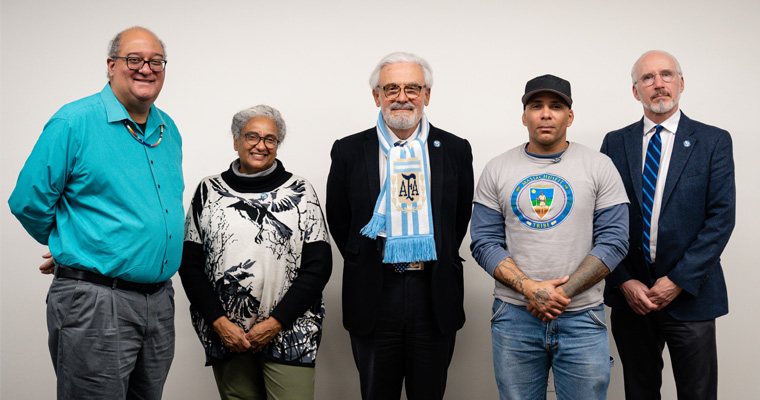- Home
- About
- Leadership & Administration
- Strategic Plan
- Strategic Priority 3: For the City
- UMass Boston, Tribal Leaders Meet to Explore Partn
Menu
- Leadership & Administration
- About Chancellor Marcelo Suárez-Orozco
- Chancellor's Cabinet Members
- Senior Leadership Team
- Chancellor's Staff
- Chancellor Event Request
- Chancellor Meeting Request
- Chancellor's Reports
- Campus Plans
- Faisal-Nichols Honorary Scholarship
- Strategic Plan
- Beacon Budget Model
- Chancellor's Lecture Series
- Beacon Wellness Initiative
- Restorative Justice Commission
- Mission
- Facts & Figures
- Accreditation & Rankings
- History of UMass Boston
- Student Consumer Information
UMass Boston, Tribal Leaders Meet to Explore Partnership
UMass Boston Chancellor Marcelo Suárez-Orozco recently met with Native American tribal leaders in whose homelands the campus now sits. This initial gathering is intended to begin a series of meetings with tribal leaders to establish a long-lasting relationship and recognition of Native Americans indigenous to Columbia Point and the region.

The informal meeting was facilitated by the director of UMass Boston’s Institute for New England Native American Studies Cedric Woods and included Provost Joseph Berger and faculty representatives Blaire Morseau, assistant professor of anthropology, and Maria John, assistant professor of History) from the Native American and Indigenous Studies program.
Tribal leaders in attendance included the Sagamore of the Massachusett Tribe at Ponkapoag Faries Gray and tribal council member and elder Elizabeth Solomon of the Massachusett Tribe at Ponkapoag.
The meeting was the first in what is planned to be an ongoing series of discussions with area tribal leaders to help the university more fully understand the scope of its responsibilities to the Native American tribes in Massachusetts and inform its ongoing response to the history of injustice inflicted on indigenous people.
UMass Boston has taken initial steps such as establishing Indigenous Peoples Day, commissioning Indigenous art installations on campus, launching a resource portal for Native American and indigenous students, and enhancing engagement and support of UMass Boston’s Native American / Indigenous student population.